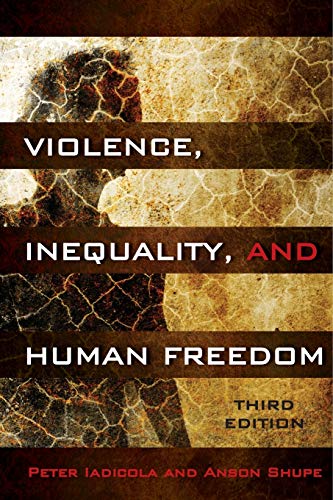Synopsis:
Violence, Inequality, and Human Freedom Violence, Inequality, and Human Freedom is a sociological introduction to the study of violence that looks at violence on three different levels-structural, institutional, and interpersonal. The third edition is updated throughout, including a new chapter on educational violence and revised sections on economic and international violence. Full description
Review:
Freshly updated, this pioneering text offers a much-needed expansion of criminology from violence step-by-step from interpersonal to institutional and international structural levels of violence. Richly illustrated and clearly presented, this engaging book invites students and teachers alike to become aware of the many interrelated forms of violence they encounter in their own daily lives.--Hal Pepinsky, professor emeritus, Indiana University Bloomington
Iadicola and Shupe provide a holistic discussion of violence incorporating a theoretically well-grounded interdisciplinary approach. The authors recognize and illuminate the interplay between interactional, institutional and structural levels, moving beyond the traditional scope of violence to include the often overlooked aspects such as empire harm, corporate harm that have been constructed as legitimate but nonetheless are forms of violence. The relationship between violence, inequality and power remains a constant theme throughout the book, highlighting the importance of them in the production of violence and victimization.--Dawn L. Rothe, Old Dominion University
The great virtue of this book is its ability to situate multiple and complex forms of violence within the context of structures of inequality. Not only do Iadicola and Shupe convincingly demonstrate that violence in general is caused by these structures of inequality, they also brilliantly analyze the most damaging forms of violence-corporate, state and structural-and their relationship to historical social structures as well. Violence, Inequality, and Human Freedom serves not only as an outstanding introduction to the subject of violence, it also examines the threat that the various forms of violence pose to the cherished values of human reason and freedom.--Ron Kramer, Western Michigan University
In this engaging book the authors succeed in systematically linking violence (broadly conceived) to inequality and to freedom. Readers will acquire a deep and multi-faceted understanding of these core societal challenges. Much of great value can be learned from this book.--David O. Friedrichs, Distinguished University Fellow and Professor of Sociology/Criminal Justice, University of Scranton (Pennsylvania)
I've used previous versions successfully for a decade in an upper-division university class on violence. Iadicola and Shupe have created a very good analytical tool to study violence from a sociological perspective--better than any book in this area. This theoretical framework is very successful in analyzing the various forms of violence the authors cover. Students who relate to the sociological perspective acquire a greater understanding of the violence phenomena though reading this text. This updated version will be a much needed contribution in analyzing various forms of structural violence in light of the world-wide social changes following the global economic crisis of 2008.--Gunnar Valgeirsson, California State, University, Los Angeles
"About this title" may belong to another edition of this title.
![]()
